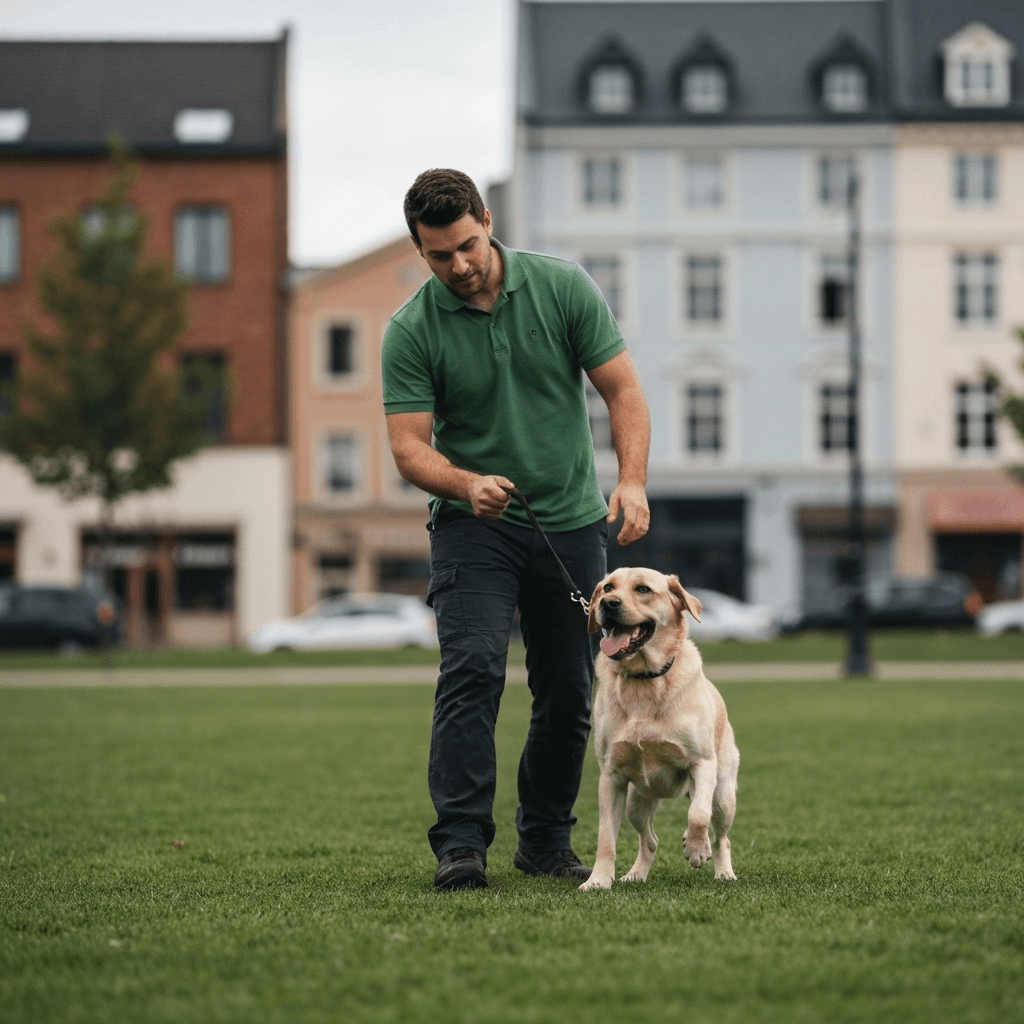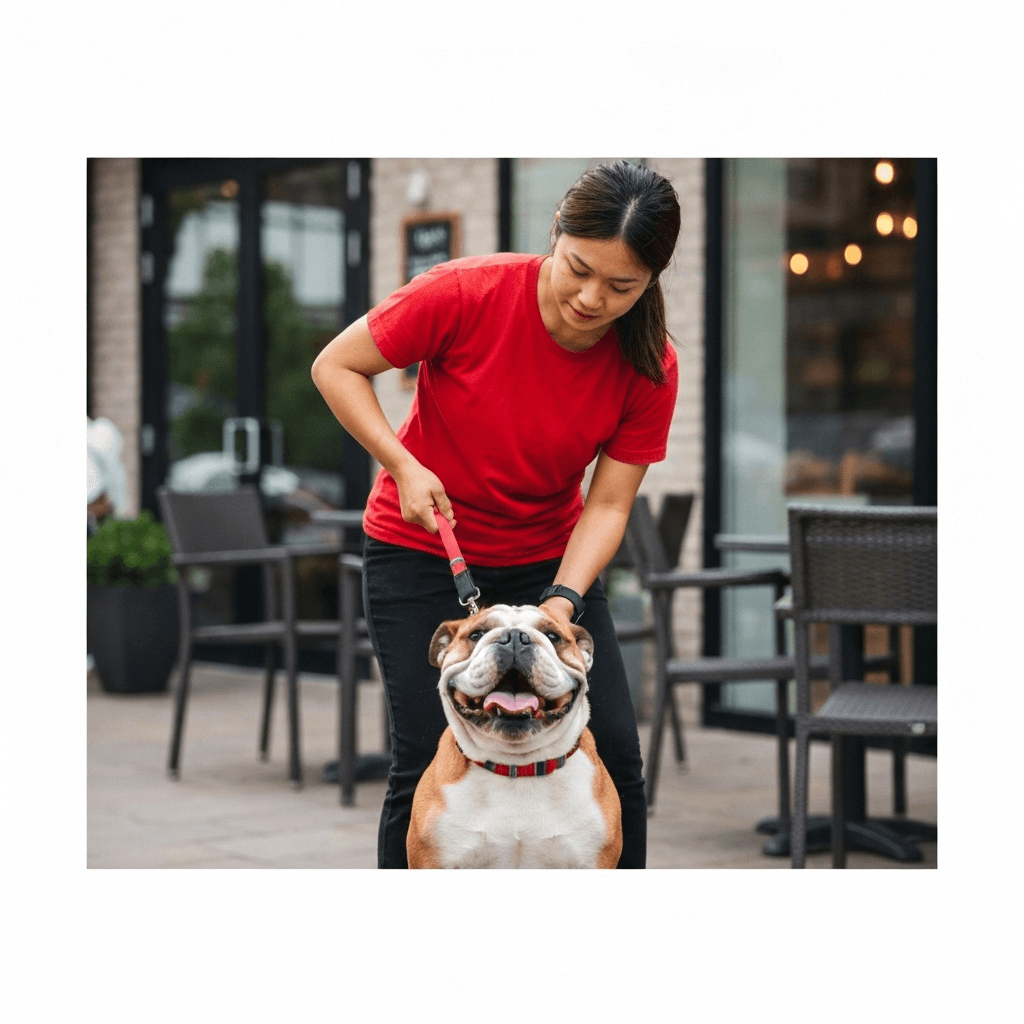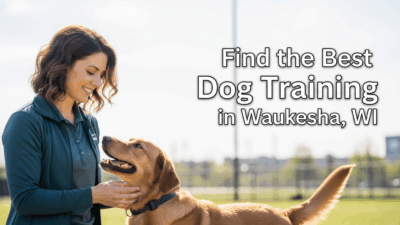Your Complete Guide to Choosing a Dog Trainer in Waukesha
Living with a dog in Waukesha means navigating busy sidewalks downtown, enjoying peaceful walks along the Fox River, and making sure your pup has good manners at Frame Park during community events like Friday Night Live. Finding the right trainer can make all the difference between a dog who pulls you down Main Street and one who walks calmly beside you through all the excitement our city has to offer.
A trainer who really knows Waukesha County and understands the unique challenges of city life here will help your dog succeed in real situations, not just in a training room.
How to Choose the Right Trainer
The best trainers use positive reinforcement methods that build your dog’s confidence while teaching them reliable skills they’ll actually use around town. These methods work because they help your dog want to make good choices, rather than forcing them through fear or intimidation.
When you’re comparing trainers, their credentials tell you a lot about their knowledge and commitment to staying current. Look for science-based dog trainer certifications like KPA-CTP or CPDT-KA. For more complex behavior issues, you’ll want someone with advanced credentials like IAABC-CDBC or CBCC-KA.
If your dog has serious behavioral challenges, ask about specialized programs like CTC and whether the trainer pursues continuing education such as CPDT-KSA. This shows they’re serious about their craft and keeping up with new research.
In-home training works particularly well for puppies learning house manners, dogs who jump on visitors at the door, or reactive dogs who get overwhelmed in new places. You’re working on the exact problems you face in your own neighborhood, which means faster results that actually stick.
Group classes offer something different but equally valuable. They give your dog practice being calm around other dogs and people in a controlled setting before you head to busier spots downtown or to summer festivals.
Day training can be a lifesaver when your schedule is packed, though any good program requires your involvement to maintain the progress at home. Board and train programs sound appealing, but they only work if the trainer spends significant time teaching you how to continue what your dog learned while they were away.
Understanding Different Training Methods

The most effective methods focus on teaching your dog what you want them to do, rather than just punishing what you don’t like. These reward-based approaches reduce stress for both of you and create more stable, reliable behavior when you’re out and about in Waukesha.
Basic obedience covers the essentials every city dog needs: sitting politely for greetings, staying when asked, coming when called, settling in one spot, and walking on a loose leash. These skills transform daily life, whether you’re navigating the Riverwalk during busy weekends or walking through neighborhoods where kids might run up to pet your dog.
Puppy training tackles the early weeks when everything matters most. Good programs cover socialization to city sights and sounds, house training routines that work with your schedule, gentle bite inhibition, crate comfort, and short, positive leash experiences. Getting these right from the start prevents so many problems later.
Behavior modification addresses deeper issues like fear, reactivity toward other dogs, separation anxiety, or resource guarding. These programs use careful, scientific approaches like desensitization and counterconditioning to help your dog feel differently about triggers, not just suppress their reactions.
Private lessons give you completely customized coaching for your specific situation, while group classes provide safe, structured practice around distractions. Both have their place in a complete training plan.
Specialty programs like therapy dog preparation or service dog training add public access manners and systematic skill-building for dogs who will have special jobs in the community.
One important note: avoid any trainer who relies on intimidation, shock collars, or punishment-based methods. Beyond being unnecessarily harsh, these approaches often create new problems and can make you liable if your dog’s behavior gets worse instead of better.
What Training Costs in Waukesha (2025 Rates)
Training costs vary quite a bit depending on the trainer’s experience, how long sessions last, and where exactly you’re located in Waukesha County. Here’s what you can expect to pay locally.
| Service Type | Average Cost (Waukesha/Waukesha County) |
|---|---|
| Puppy classes (4–6 weeks) | $150–$250 total |
| Group obedience classes (4–6 weeks) | $160–$280 total |
| Private lessons (60–90 min) | $110–$180 per session |
| In-home coaching packages (4–6 visits) | $450–$850 total |
| Day training (trainer works dog + handoff) | $500–$950 per week |
| Initial behavior consult (reactivity/anxiety) | $140–$220 |
| Board and train (2–4 weeks) | $1,900–$4,200 total |
Prices tend to be higher for complex behavioral issues, if you’re outside the main Waukesha area, or when programs involve multiple trainers. Many trainers offer package deals that bring down the per-session cost, so ask about options that fit your budget.
Questions to Ask Potential Trainers
Before you commit to working with anyone, you’ll want to understand their approach and make sure they’re a good fit for your situation. Here are the key questions to ask:
- What specific methods do you use, and how do you keep training sessions positive and low-stress for my dog?
- What certifications do you hold, and how do you stay current with new research and techniques?
- How will you adapt your program to work with my daily routines and the specific places we go in Waukesha?
- What format do you recommend for my goals – private lessons, in-home training, group classes, or day training?
- How will we track my dog’s progress, and what happens if we hit roadblocks?
- Do you provide written training plans, homework assignments, or video feedback between sessions?
- What exactly is included in your pricing, and are there any additional fees for travel or materials?
- Can we start with a consultation or evaluation to make sure we’re a good match?
- Do you carry liability insurance, and can you show me proof of coverage?
- If my dog has behavioral issues, will you work with my veterinarian to rule out medical causes?
Don’t hesitate to ask for references from recent clients, especially those with dogs similar to yours. A confident, experienced trainer will be happy to connect you with people who can share their experiences.
Navigating Local Rules and Regulations
Understanding Waukesha’s local laws helps you train your dog properly and avoid problems with neighbors or city officials. Leash laws require dogs to be on leash in all public areas within city limits, except inside designated off-leash dog parks. A standard 6-foot leash works best for training and gives you good control around downtown sidewalks and trail systems.
Every dog 5 months and older must have current rabies vaccination and a valid license tag from Waukesha County. Fees are usually lower if your dog is spayed or neutered, and you can find current requirements and deadlines on the Waukesha County dog licensing page.
Wisconsin takes rabies seriously, and there are specific protocols if your dog is ever involved in a bite incident. The state health department maintains detailed information at Wisconsin DHS rabies information that covers vaccination requirements and what happens if problems arise.
Nuisance ordinances cover excessive barking, so it’s worth working on training that keeps your dog calm when visitors arrive, when they’re alone, and during daily activities that might trigger excitement. Good training prevents complaints and keeps peace with your neighbors.
If your trainer wants to use county parks for group sessions, they need to follow commercial activity rules and may need permits and insurance documentation. You can check current regulations for dog areas at Waukesha County Parks dog exercise areas before planning any training sessions.
Wisconsin doesn’t require special licenses for dog trainers, but legitimate businesses should carry liability insurance and provide clear contracts that spell out what you’re getting for your money.
Local Resources Every Waukesha Dog Owner Should Know
Waukesha County offers several excellent spaces for training and exercise, each with its own advantages. Minooka Park Dog Exercise Area in Waukesha provides large, fenced off-leash zones that are perfect for practicing recall during quieter weekday hours when there are fewer distractions.
Menomonee Park Dog Exercise Area in Menomonee Falls has multiple fenced sections plus nearby trails where you can work on leash skills after your dog has burned off energy in the off-leash area. Mukwonago Park Dog Exercise Area offers similar opportunities with the bonus of hiking trails that let you practice obedience commands in new environments.
For on-leash training, Frame Park’s Riverwalk gives you smooth, wide paths with gentle distractions like joggers and families. It’s an ideal place to practice loose-leash walking before tackling busier downtown areas.
The City of Waukesha Clerk’s Office can help with licensing questions, renewal deadlines, and fee information. The broader Waukesha County Park System maintains numerous trails that are perfect for building your dog’s focus and impulse control around bikes, other walkers, and wildlife.

Common Questions About Dog Training in Waukesha
How much does in-home dog training cost?
Most trainers in the Waukesha area charge between $110 and $180 for individual in-home sessions. Many offer package deals that reduce the per-session cost, and prices may be higher for complex behavioral issues that require specialized expertise.
Is in-home dog training worth the extra cost?
Absolutely, especially if you’re dealing with issues that happen specifically at your house or in your neighborhood. You’re working on the exact problems you face every day, using your actual doors, sidewalks, and distractions, which makes progress faster and more reliable.
Can I hire someone to house train my puppy?
Many trainers include house training in their puppy programs or day training services. They’ll set up schedules, teach crate comfort, and show you how to read your puppy’s signals, but you’ll still need to be consistent every day to make it work.
What is the 3-3-3 rule for dog training?
This guideline suggests dogs need about 3 days to decompress in a new situation, 3 weeks to start learning your routines, and 3 months to feel fully settled and confident. Good training programs respect this timeline instead of rushing results.
How long will it take to see results from training?
Most dogs with basic manners issues show significant improvement within 4 to 8 weeks of consistent training. More complex problems like reactivity, fear, or separation anxiety typically take several months of careful, systematic work.
What should I bring to my first group class?
Pack a flat collar or front-clip harness, a standard 6-foot leash, small high-value treats your dog loves, a water bowl, and vaccination records if the trainer requests them. Leave retractable leashes at home since they’re not safe in group settings.
What’s the leash law in Waukesha?
Dogs must be on leash in all public areas and city parks unless they’re inside a designated off-leash area. You’re responsible for keeping your dog under control around sidewalks, paths, and community events, regardless of how well-trained you think they are.
Do I need a dog license in Waukesha County?
Yes, all dogs 5 months and older must be licensed and wear their tag. Licenses are typically renewed each year with fees due in early spring, and there are late penalties if you miss the deadline.
What vaccinations does my dog need in Wisconsin?
Rabies vaccination is required statewide and must be current for licensing. Your veterinarian may also recommend core vaccines like distemper-parvo and bordetella based on your dog’s lifestyle and exposure risks.
Are dog trainers licensed in Wisconsin?
Wisconsin doesn’t require special licensing for dog trainers, so it’s up to you to verify their credentials, insurance coverage, and training methods. Look for certified trainers who provide clear contracts and use humane, science-based methods.
Where can I practice off-leash recall safely?
The fenced dog exercise areas at Minooka, Menomonee, and Mukwonago Parks are your best options. Start during less busy times when there are fewer distractions, and always make sure your dog has solid recall in easier environments first.
Which local dog parks allow training?
All the county dog exercise areas welcome training as long as you follow posted rules and don’t disrupt other users. Focus on calm, polite behavior rather than intensive training sessions when other dogs are around.
What trails and parks allow dogs in Waukesha County?
Most Waukesha County parks welcome leashed dogs on their trail systems, though rules vary by location and season. Always check posted signs for current regulations and clean up after your dog to keep these privileges available for everyone.
The right training approach, combined with regular practice around Waukesha’s parks and neighborhoods, will help your dog become the confident, well-behaved companion you both want them to be. When you’re comparing trainers, focus on their methods, credentials, and ability to help you succeed in your real daily life rather than just in controlled training environments. With patience and the right guidance, you and your dog can enjoy everything our community has to offer together.
